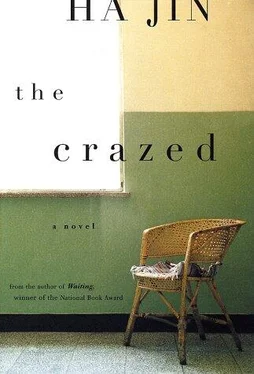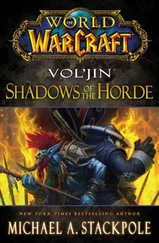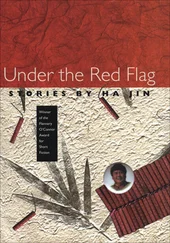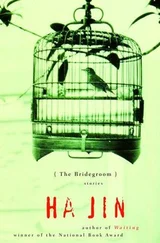Mr. Yang said to me, “I’ve heard you want to go to Hong Kong to become a businessman.” His tone was rather sardonic.
Disconcerted, I replied, “They are interested in me, but I haven’t decided yet.”
“Do you think you’re good at handling imports and exports?” His voice turned serious.
“I don’t know.”
“Can you dispense with the study of poetry? Maybe you can, and I have been wrong about you.”
“That’s what I’ve been thinking about. Honestly I don’t feel like going into business. I love poetry, you know that, but everybody wants to get rich nowadays.”
“Well, you are not everybody.” He slowed down his pace and pointed at a thirtyish man pulling a cart loaded with cinders and garbage, the man’s naked back dripping sweat. “Look at that fellow over there,” Mr. Yang went on. “No matter how much money he has, I bet he will sleep on the street tonight. Even if he makes tens of thousands of yuan someday, he will never become a man who is really rich. He won’t want to stay at a hotel or fly to Shanghai. He was born poor and will remain so.”
“What do you mean?” I muttered, uneasy about the superiority he felt over the trash collector.
“If you are determined to study literature, spiritually you must be an aristocrat. Many of us have been poor all our lives, but we are rich in our hearts, content to be a Don Quixote.”
I didn’t know how to respond to that and kept walking silently.
Placing his hand on my shoulder, he added, “Think about this matter carefully, Jian. I won’t make you do anything against your heart, but it’s time for you to choose your way of life.”
It took me a few days’ soul-searching to make up my mind. When I told Mr. Yang about my decision to abandon the lucrative opportunity, he said with his eyes shining, “Jian, I knew you would be clearheaded about this. If you were someone else, I wouldn’t have bothered to talk to you about it. From now on, I’ll make you work harder.”
“I’m looking forward to that.”
I was moved by my own choice, which I regarded as a sacrifice. On the other hand, once the decision was made, I suddenly felt at peace, and even my dinner tasted better. Gradually I could see that Professor Yang treated me differently from the other graduate students; he often assigned books and papers for me to read alone.
Half a year later, his daughter and I got engaged.
I apologized to Banping for being late, delayed on the way by traffic.
“That’s all right,” he said.
“How was he this morning?” I asked about Mr. Yang.
“Awful.”
“What happened?”
“He sang a lot of songs.”
“What did he sing?”
“All kinds of stuff, from revolutionary chants to opera snatches.” Banping shook his head, smiling facetiously.
His smile evoked a strange feeling in me, a mixture of sadness and aversion. In my head a voice suddenly said about our teacher, He’∂ be better off if he lost his speech.
Meanwhile Mr. Yang was asleep, his nose making a tremulous sound.
Banping walked out, holding a battered black umbrella and a bulky book, An Omnibus of Spy Stories. He had been writing a detective novel, which I wasn’t sure he’d ever finish. I had noticed that his feather bookmark was moved toward the back of the book about a hundred pages a day. He still could read quite a bit while attending our teacher, whose rigmarole didn’t seem to bother him at all. Today I had with me only a pocket English dictionary. I sat down and began reviewing the word entries I had underlined.
About half an hour later Mr. Yang stirred and muttered something. I tried to ignore him, but couldn’t help glancing at him from time to time. His flabby face, less puffy today, was duck-egg green, and his hair looked shaggy despite the fact that I had washed and combed it the previous afternoon. His lips quivered weirdly. For a moment I couldn’t understand his odd facial expression — the corners of his mouth jerked while he breathed noisily.
Was he crying? He didn’t look so. He must be smiling at someone. I knew that whenever he was in good spirits, his tongue would lick his upper teeth. He had often smiled like this in class. I averted my eyes. As long as he kept everything to himself, I’d go on perusing the dictionary.
But soon he started speaking aloud. I couldn’t help but crane forward listening. He seemed to be reciting something. He definitely looked happy, pinkish patches rising on his face while his lungs labored wheezily. All of a sudden words poured out of his mouth:
Oh glorious stars, oh light infused with
Divine Power, to you I owe all my genius—
Whatever be its worth.
Born with you and hidden with you,
He who is the father of mortal life,
When I first breathed the Tuscan air.
And far away, as I was granted the grace to enter
The high wheeling sphere in which you roll around,
Your very region was assigned to me.
Devoutly my soul sighs to you now
So that it may gain the strength
For the hard journey leading to the final end.
He paused, beaming, but his mouth, its corners twitching, reminded me of a rabbit that had just bitten hot pepper. “You cannot trap my soul, nobody can!” he cried stridently.
What poem is that? I wondered. Its joyful, sonorous tone and its fluid cadence suggested a foreign poem. The heavenly vision was definitely not something that would occur in Chinese poetry. Then I realized it must be a passage from The Divine Comedy.
He recited again:
“You are so close to the ultimate bliss,”
Beatrice began, “that you must purify your passion
And keep your eyes clear and keen.
Before you go further into it,
Look down and see how much of the world
I have spread beneath your feet,
So that your heart, with full joy,
May show itself to the triumphant throng
Who comes rejoicing through the surrounding air.”
He stopped, as if to think about the words voiced by Beatrice, whose name enabled me to locate where Mr. Yang was in The Divine Comedy. He was in Paradiso, because only in that book did Beatrice meet Dante.
As he went on reciting, his face became more relaxed, but his words were disordered and unintelligible at times. I made no effort to follow him. Even if I had understood everything he uttered, I couldn’t have shared Dante’s heavenly vision. I was on earth, in this hellhole, whereas he was led by Beatrice through the divine domain and basked in the chaste love and the celestial light. Perhaps only a deranged person could enjoy such a sublime illusion.
Then I curbed my irreverent thoughts as I remembered what The Divine Comedy meant to Mr. Yang. The poem had once saved his life.
Two years ago, on an early-summer morning, I had gone to his office and found him hunched over his desk reading a well-thumbed book. Stepping closer, I attempted to sneak a look at its title. He realized my intention and raised the book to show me its front cover, which contained a picture of numerous fists, of various sizes, all stabbed upward into the air. It was Inferno. “Have you read Dante?” he asked me in a nasal voice. He had a stuffy nose as a result of a cold.
“No, I haven’t.” Unable to say yes, I was somewhat embarrassed.
“You should read The Divine Comedy. After you finish it, you will look at the world differently.”
So I borrowed all three books of the poem from the library and went through them in two weeks, but I didn’t enjoy the poem and felt the world remained the same. On the other hand, I was horrified by the filth and torture to which the damned are subject in Inferno. When I told Mr. Yang that I had read the poem, he asked me to comment on it. Taken by surprise, I had little to say and just summarized some grisly scenes in hell. My thoughts rambled, and I even talked about the austere woodcut illustrations.
Читать дальше

![Lao Zi - Dao De Jing [Tao Te Ching] (english)](/books/3890/lao-zi-dao-de-jing-tao-te-ching-english-thumb.webp)
![Lao Zi - Dao De Jing [Tao Te Ching] (chinese)](/books/3891/lao-zi-dao-de-jing-tao-te-ching-chinese-thumb.webp)
![Lao Zi - Dao De Jing [Tao Te Ching] (espanol)](/books/3892/lao-zi-dao-de-jing-tao-te-ching-espanol-thumb.webp)







